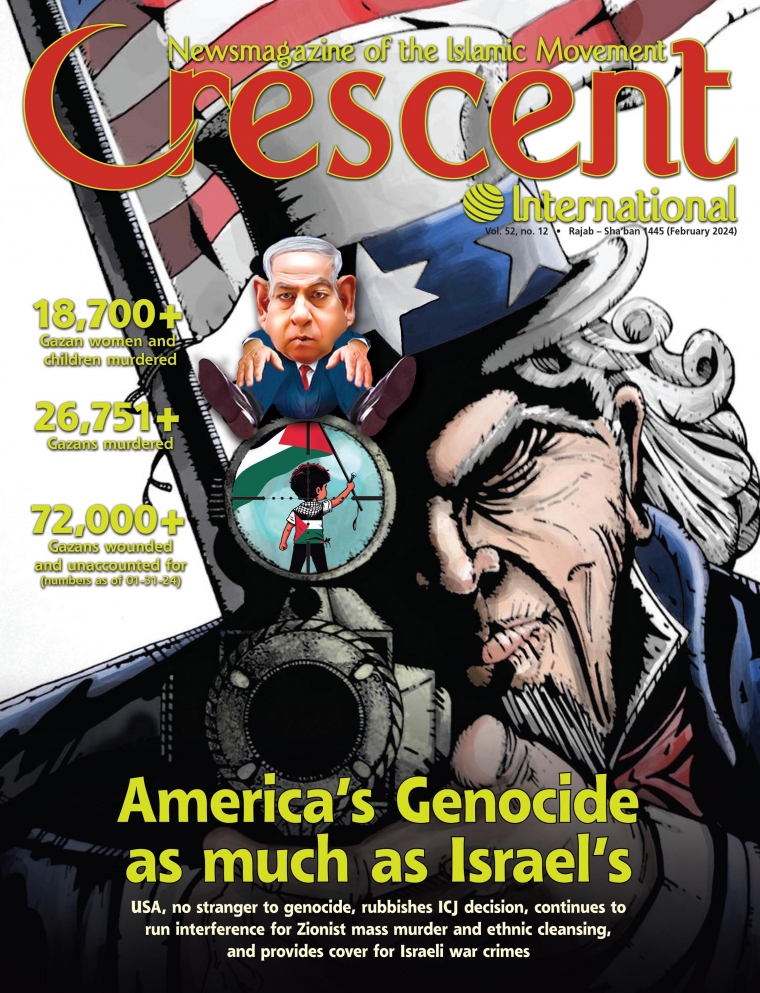Crescent International Vol. 53, No. 12
Newsmagazine of the Islamic movement
Afeef Khan, Jawwad Mulla , Hayy Yaqzan
Rajab, 1445 2024-02


Despite the ICJ ruling of January 26 demanding the Israel take steps to prevent genocide, the zionist terrorists continue their attacks on unarmed Palestinian civilians in Gaza. The death toll has surpassed 26,000 with 6,000 injured, some of them critically.

The tit-for-tat attacks between Iran and Pakistan shocked most observers. While both countries have walked back from the brink and vowed to resolve issues through dialogue, serious problems remain.

The West Asia region bristles with US military bases. It is not difficult to surmise who they are meant against. The illegitimate Arab regimes facilitate these bases to undermine the Islamic Republic.

The tunnels in Gaza have proved a very effective means of confronting the zionist invaders of Gaza. The Palestinian Islamic resistance has inflicted significant damage on the zionists. It has striking parallels with the trench the Muslims dug in Madinah as defence mechanism in the Battle of Ahzab.

After the Prophet (pbuh) left this earthly abode, those that took over leadership position of the Muslims did not impose themselves. Solidarity between the Muhajireen and Ansar was strong that enabled the Muslims to confront the challenge in the war of Riddah.

After the victory of the Islamic revolution in Iran, Imam Khomeini called for export of the revolution. The illegitimate Arab rulers thought Iranian forces would invade them. By export, the Imam meant exporting the idea as witnessed in the emergence of the Axis of Resistance.

The Assembly of Experts is a very important institution in Iran. It will hold elections on March 1. This election is crucial because the new assembly may have to elect a new Rahbar (Leader) of the Islamic revolution.

President Erdogan continues to display contradictory behavioural traits. His rhetoric in staunchly pro-Palestinian but Turkey’s trade and diplomatic ties with zionist Israel remain strong. Turkish-Israeli trade has grown amid the Israeli onslaught on Gaza.

While Syria continues to grapple with the disruptive presence of Daesh terrorists, now confined to a small area, Damascus still faces multiple challenges. These include the illegal presence of US forces on its soil and Israel’s incessant attacks on its infrastructure killing both Iranian advisors and Syrians.

Pakistanis will go to the polls on February 8 but the largest political party—Pakistan Tehreek-e Insaf led by Imran Khan—faces immense hurdles. Its leader remains in jail on bogus charges and the party has been denied its party symbol intended to hamper its supporters.

Emergence of an expanded BRICS has been hailed as a major challenge to the west-centric global order. Major players in BRICS, however, are not part of the Axis of Resistance and continue to seek a place in the old order.

The conflict in Ukraine had dominated news headlines since February 2022 when Russia launched is “special military operation”. This has now been eclipsed by the Israeli war on Gaza but people in the west have grown tired of Ukraine. They see it as a financial and political burden.

The US-centric global order is collapsing. Countries are beginning to seek their own avenues to protect their interests. This is evident even in Europe that has traditionally been a thinly-disguised US colony.
